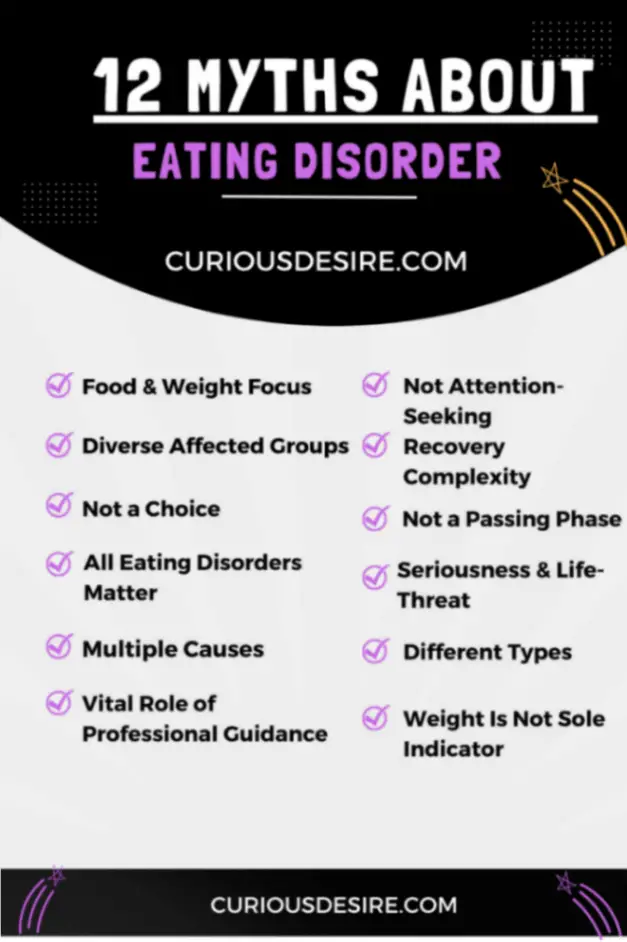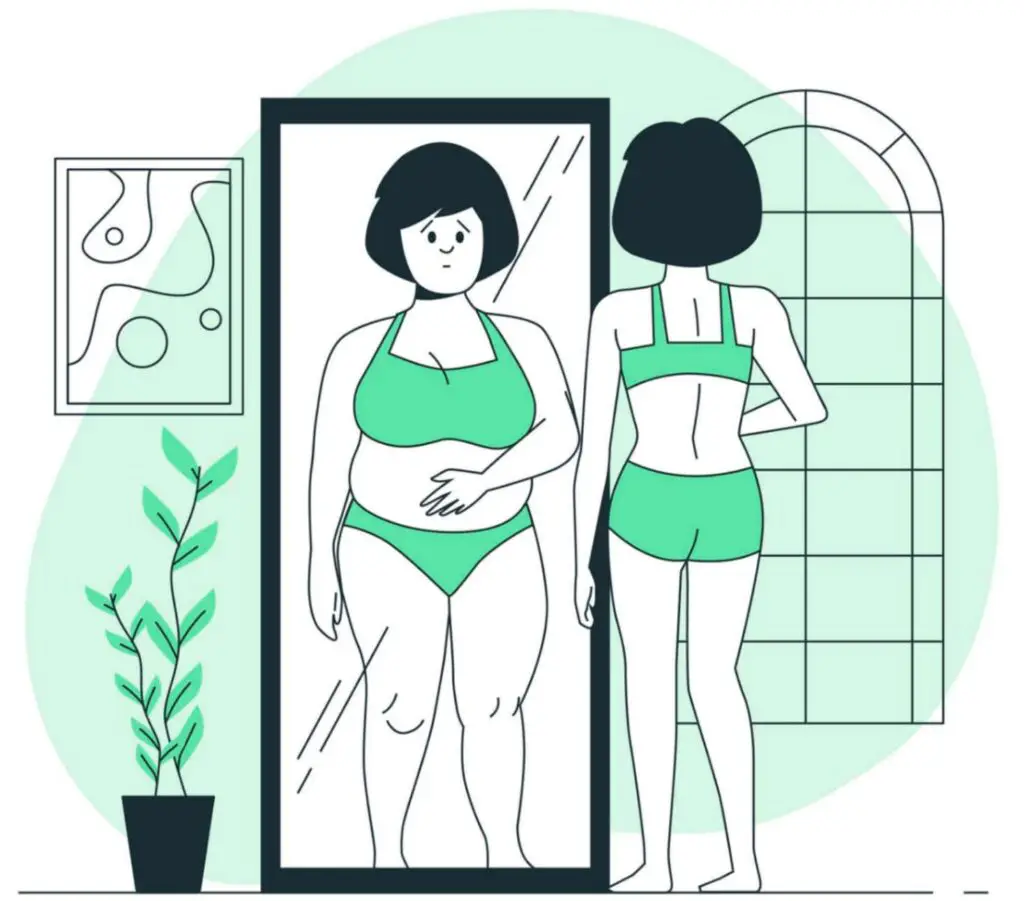In today’s busy world that’s all about appearances, eating disorders have become more noticed. But there are lots of wrong ideas out there that stop people from getting help.
In this article, we’re breaking down the top 12 myths about eating disorders. Our aim is to explain these misconceptions in an easy way, so everyone understands better and can support those dealing with these issues.
Here are the top 5 common misconceptions about the eating disorders.
- Eating disorders are solely about food and weight
- Only young women experience eating disorders
- Eating disorders are a choice, or lifestyle
- Only specific, visible eating disorders like anorexia or bulimia are serious
- Parents or family are always the cause of eating disorders
Myth 1: Eating Disorders are Solely about Food and Weight
Food behavior disorders aren’t just about what you eat or how heavy you are, those habits often act like a secret code, hinting that there might be more going on inside, tangled up with our emotions and how our minds work.
They’re influenced by psychological, societal, and emotional factors that go beyond simple concerns about appearance. Here are the key psychological, societal, and emotional factors contributing to eating disorders:
Psychological Factors:
- Low Self-Esteem: Feelings of inadequacy or dissatisfaction with oneself.
- Perfectionism: Aiming for standards that aren’t real and being very hard on oneself.
- Body Image Issues: Perceptions about body shape or size that have changed.
- Control and Coping Mechanisms: Using food control as a coping strategy for stress, trauma, or anxiety.
- Mental Health Conditions: Conditions like anxiety, depression, or obsessive-compulsive disorder often coexist with eating imbalances.
Societal Factors:
- Media and Societal Pressures: Society often presents perfect bodies in media, leading to unrealistic standards.
- Cultural Expectations: Societal norms that prioritize thinness or certain body shapes.
- Social Influence: Feeling pressured to adopt specific body ideals or eating habits from friends or within one’s social circle.
- Family Interactions: Family attitudes or behaviors regarding food, weight, or appearance.
Emotional Factors:
- Trauma or Stress: Past trauma, abuse, or stressful life events can trigger disordered eating.
- Emotional Distress: Difficult emotions like sadness, anxiety, or loneliness can lead to using food as a coping mechanism.
- Lack of Coping Skills: Inability to manage emotions or stress in healthy ways.
- Lack of Control: Feeling overwhelmed or lacking control in life circumstances.
Myth 2: Only Young Women Experience Eating Disorders
Why This Myth Exists:
Myth 3: Eating Disorders are a Choice, or Lifestyle
Why This Myth Exists:
This myth exists because some believe eating disturbances comes from personal choices related to food or appearance. It overlooks the complexities involving genetics, emotions, and societal influences contributing to these conditions.
Debunking the Myth:
Existence of this is due to a misunderstanding of disordered eating. Some individuals might believe it because they perceive these disorders as a intentional choice or lifestyle decision.
This misconception comes from oversimplifying complex mental health conditions, overlooking the complicated psychological and emotional factors involved.
Additionally, societal discrimination or lack of awareness might lead to the misconception that individuals can easily control or choose to have eating disorders, disregarding the significant impact these conditions have on a person’s well-being.

Myth 4: Only Specific, Visible Eating Disorders like Anorexia or Bulimia are Serious
Why This Myth Exists:
This myth exists because these specific disorders often get more attention in the media and conversations. People see these disorders as serious because they’re more visible and talked about, overlooking other equally serious but less highlighted eating disorders.
Debunking the Myth:
Some individuals think only anorexia or bulimia are serious because those are the ones everyone talks about. These disorders get a lot of attention in the media and conversations, making them seem like the most severe ones.
But there are others, like ARFID or orthorexia, that don’t get as much spotlight. Since these disorders might not show extreme weight loss or obvious signs, some think they’re not as serious.
But these lesser-known ones can seriously affect how someone feels and their life, even if they don’t look the same as anorexia or bulimia. Here are the Lesser-Known Eating Disorder Factors, which are important to understand.
- Mental Health Impact: All disordered eating, whether you see them or not, make people feel very anxious, sad, and have trouble with everyday tasks.
- Physical Health Impact: Some less-known disorders can cause problems with eating that make you miss out on important nutrients and don’t let you grow well.
- Neurobiological Factors: Different eating imbalances might affect the brain in similar ways, even if you can’t see them easily.
- Treatment Challenges: Helping with eating irregularities, whether common or not, is equally difficult and serious.
- Quality of Life Impact: Less-known disorders can make life harder, just like the ones you often hear about
Myth 5: Parents or Family are Always the Cause of Eating Disorders
Why This Myth Exists:
Some people think that family problems cause eating disorders because they used to believe that issues at home lead to these struggles.
This happens because individuals simplify things, thinking family arguments or how parents raise children are the main reasons, overlooking other important factors.
Debunking the Myth:
Families aren’t always the reason for eating disorders. These struggles come from many things like genes, society, and personal experiences.
Saying it’s just because of families ignores all the different things that play a part in causing these problems.
Myth 6: Only Professional Help isn’t Necessary; They can be Overcome Independently
Why This Myth Exists:
This misconception comes from thinking that we should solve things on our own, believing strong willpower is enough. People might hesitate to ask for help because they worry about what others might think.
They forget that eating disorders are complex and need specific support, thinking they can handle it alone.
Debunking the Myth:
Myth 7: Eating Disorders are Attention-Seeking Behaviors
Why This Myth Exists:
This myth often comes from misunderstandings about why people develop eating disorders. Some might think these struggles are just for attention, assuming that individuals intentionally choose to have these problems to get noticed.
Debunking the Myth:
Opposite to the idea that eating disorders are attention-seeking behaviors, they are complex mental health conditions. These struggles often comes from deep emotional distress, societal pressures, and psychological factors, rather than being a intentional attempt to seek attention.
This misconception ignores the seriousness of these disorders and the genuine challenges individuals face.
Myth 8: Recovery Means Just Gaining Weight
Why This Myth Exists:
Debunking the Myth:
Recovery from an eating disorder isn’t solely about gaining weight. It involves mental and emotional healing, changing harmful thoughts and behaviors about food and body image.
While weight gain can be a part of recovery for some, it’s not the only measure of getting better.
Myth 9: Eating Disorders are a Phase and Will Go Away on Their Own.
Why This Myth Exists:
This idea arises from a misunderstanding of the nature of eating irregularities. Some people might believe it because they think these struggles are temporary phases that individuals will move past naturally.
Also, how society sees these disorders sometimes makes them seem simpler than they are, thinking they’re just phases rather than serious mental health problems that need professional help.
Debunking the Myth:
Scientifically, these disorders involve complex neurobiological and psychological factors. They’re not just temporary stages, as they continue and get worse without proper help.
Getting Professional help, addressing these various causes, is important for lasting recovery, proving eating disorders aren’t passing phases but serious mental health condition.
Why This Myth Exists:
This misunderstanding is around because some people don’t realize how serious dietary difficulties could be. They might think they’re not that dangerous because they don’t fully understand how these problems affect a person’s mental or physical health.
Also, society sometimes doesn’t talk enough about the real risks, making it seem like dietary imbalances aren’t as life-threatening as they truly are.
Debunking the Myth:
Disordered eating are indeed serious and can be life-threatening. Scientifically, these conditions affect the body and mind, leading to severe health complications.
Studies consistently highlight the high risk of deadly outcomes linked with eating disorders, emphasizing the need to address them early with professional help.
Myth 11: Anorexia Nervosa Is the Only Type of Eating Disorder
Why This Myth Exists:
Debunking the Myth:
Getting Support for an Eating Disorder
The journey to feeling better when things are tough isn’t just about what we see. It’s about emotions and thoughts, and it can affect anyone, no matter how they seem. These struggles are serious and need different kinds of help to get better.
Talking to experts, going for chats about feelings, learning about food, and having family and friends involved are all big steps. Keeping at it, staying away from things that make it harder, and being happy about small victories are all super important in this journey to feeling better and avoiding setbacks.
Let’s dive deeper into why these things matter so much. The way forward isn’t just about food and how we look. It’s about how we feel inside and how we deal with tough stuff.
This isn’t something only a few people face – it’s something anyone can go through. Recognizing that these struggles are real and need lots of different kinds of help is key to feeling better.
First up, talking to folks who know about these things is really important. They can give personalized advice and help us understand what’s going on inside our heads. These pros guide us through the tough feelings and thoughts we might have.
Having chats with someone who helps with feelings (we call it therapy) is a big deal. It’s a safe place to talk about what’s on our minds, find out why we feel a certain way, and learn how to handle hard times better.
Learning about what’s good to eat isn’t just about diets. It’s about finding a healthy way to look at food. This means getting the right balance and understanding how food helps us feel good in our heads and bodies.
It’s about building good eating habits that help us feel strong and happy. Family and friends can be a big part of feeling better. They give us support, cheer us on, and understand what we’re going through.
Sticking with what we’ve started is super important. The journey to feeling better isn’t a straight line – it has its ups and downs. But sticking with therapy, eating right, and working on ourselves is key. It’s about seeing every small step as a win because it means we’re moving ahead.
Knowing what makes things harder for us and staying away from those triggers is really important too. This helps us create a space where we feel good and can keep getting better.
Also, doing things that help us stay calm and aware (like meditation or easy exercises) really help with how we feel. They make us stronger in handling tough times and feeling better about ourselves.
By doing all these things together, we’re not just dealing with the surface stuff – we’re looking deep into why we feel the way we do. This helps us heal and get better for real, making sure we stay on track toward feeling good and staying that way.



